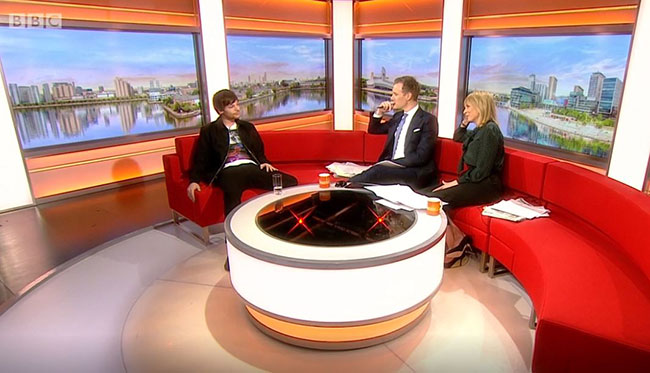With celebrities popping up left rigth and centre these days, social media continues to blur the lines between their private and public lives. Recently, the boundaries of using personal information as bait duirng interviews has caused outrage towards BBC Breakfast. So, is journalism only effective when empathy is in play? Sophia Simon-Bashall is going to find out.
One Direction star turned solo artist Louis Tomlinson recently appeared on BBC Breakfast to talk about his debut album, Walls – but ended up hardly getting to speak about the album at all. Instead, he was met with a series of questions about One Direction ‘drama’ 5 years in the past (bizarre and irrelevant) and worse. The show’s hosts, Dan Walker and Louise Minchin probed about the loss of the singer’s mother, who passed 3 years before, and his 18-year-old sister, who passed away last year. It was evidently not a topic the singer was keen on going into, answering the questions quickly and uncomfortably, trying to redirect the conversation back to the album.
After the show, Tomlinson tweeted that he “wont be going on there again” and when probed by Walker, he explained that “I was upset that you continued to ask me about my grief” and that although he is “lucky enough to have a creative outlet” with which to talk about it, interviewers do not have “the right to talk about it for gossip purposes”.
Tomlinson isn’t the only artist being unnecessarily probed about traumatic experiences in interviews – a recent LA Times interview with the k-pop group SuperM sees writer August Brown ask 26-year-old Taemin about the loss of his close friend and bandmate, SHINee’s Jonghyun. The piece acknowledges the artist’s discomfort with the topic and his desire to “keep the personal pain of that loss private” – but why write it up at all? Why bring it up in the first place? To be in the lucky position to talk to a group making waves worldwide – a group made up of 7 of the biggest names in k-pop – amid their sold-out arena tour, why is one of the member’s very painful experience something you feel important to talk about? It seems, at best, sloppy journalism – an inability to do thoughtful research and ask questions about the group’s unique position, the member’s impressive talents, and the new songs they’re performing on tour – and at worst a cynical grab for clickbait, with complete disregard for anyone’s emotional wellbeing (despite the topic being handled).
It’s not as if interviews can never approach deep topics – after all, many artists write about their personal experiences, and more and more will openly draw upon mental health. But is that an invitation to ask probing questions? Absolutely not. There has to be a way to touch upon these issues – when relevant to the art – without causing such huge discomfort. Plenty of interviewers manage it. Zane Lowe’s Apple Music interviews often run up to an hour long and are known to be in-depth conversations where Lowe and the artists speak candidly about their lives and their thoughts.
In a recent 45-minute conversation, he spoke with Hayley Williams about family trauma, therapy, divorce, depression and more. The difference? It’s a conversation – he doesn’t probe for ‘content’, he asks genuinely engaged questions based on research, true interest in and understanding of her, Paramore, and human nature. And he gets far more truth out of her than the probing of the likes of Walker, Minchin, and Brown, too. Williams says it herself – “I’m not going to tell all these other people all the things I’m going to tell [you] because I’m safe here”. He asks questions like a friend – and sometimes like a therapist – might, and adapts his tone (sometimes gentle, sometimes playful) to meet her and ask his questions in the most sensitive (but non-patronising) manner. Simply, he shows empathy and respects her boundaries – and that allows her to be more open because she feels comfortable. It makes for a great, thoughtful interview which sheds light on the thought process behind her upcoming solo album, Petals for Armor, and no doubt is helpful to many fans going through their own issues.
It’s not actually a difficult balance at all. Serious, even emotional and uncomfortable conversations can be had between artists and interviewers, whether on-air or for print – but that can only come at the artist’s willingness. Their decision to write and sing about their personal lives is not an open invitation to probe about it – in music, that vulnerability is happening on their own terms, nobody else’s, and that’s empowering. We are not entitled to the gory details of people’s trauma, regardless of their ‘celebrity’ status or the platform they hold. And when they are prepared to have those conversations, it’s not so difficult to figure out where the line is drawn – it only really takes basic human decency and empathy. If an interviewer can’t harness that, they’re in the wrong job.
Sophia Simon-Bashall
[Header Image: Hello Magazine Online]

